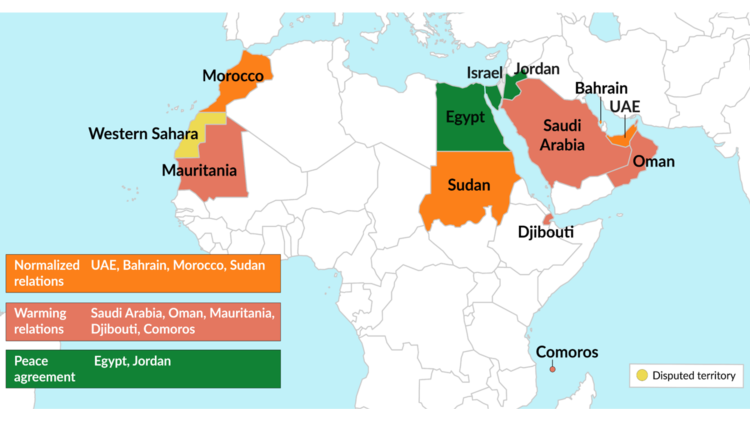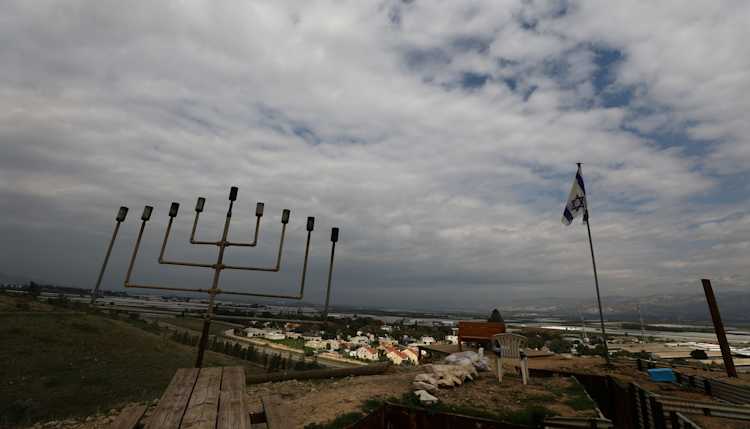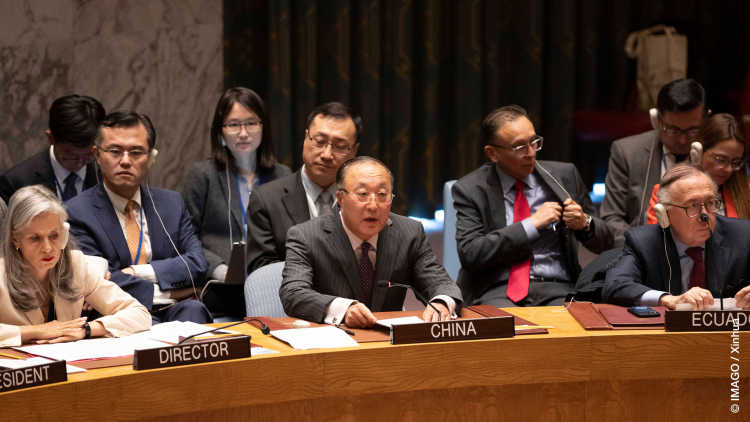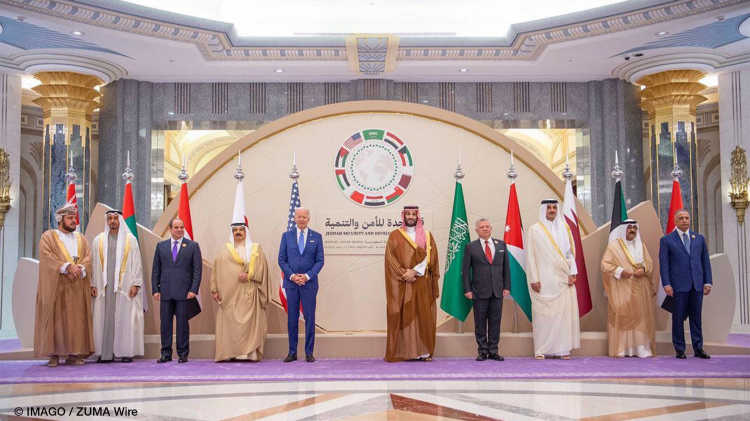- Startseite
- Publikationen
- GIGA Focus
- From New to Normal: Two Years after the Abraham Accords
GIGA Focus Nahost
From New to Normal: Two Years after the Abraham Accords
Nummer 5 | 2022 | ISSN: 1862-3611

When Israel signed the Abraham Accords in 2020 reactions were diverse. Experts were divided – some fearing a deepening of regional divisions, others hoping for a positive impact on the Middle East Peace Process (MEPP). Two years later normalisation has intensified, but differs in degree and scope.
Israel’s normalisation process has strengthened her acceptance in the region and reaches beyond security issues. While Bahrain and the United Arab Emirates lead these dynamics, eager to benefit from exchange in science and technology, in Morocco the United States’ recognition of the latter’s sovereignty over the Western Sahara has hardened Rabat’s position on that issue. With Sudan, the process has not developed beyond contact between the Israeli government and the internationally contested military leadership.
Normalisation is not a decisive factor for Israeli–Palestinian conflict resolution. On the contrary, it was not an incentive in the past for Israel to make concessions; clashes with the Palestinians in Gaza or recently on the Temple Mount could not derail the process either. The real test, however, would be another Palestinian intifada or a return to the annexation plans of early 2020.
Iran remains an important uniting factor which has led to a shared threat perception. Nevertheless, the Gulf monarchies and Israel differ in approach towards Iran. While Arab–Israeli joint military exercises mark a historical shift, talks about a military alliance in the Middle East with Israeli (and US) involvement are premature.
Policy Implications
The European Union and its member states should build on these positive dynamics and look at developments in the region not merely through the lens of the MEPP. Trilateral projects with Israel and Arab partners are a good starting point here. Also, Europe should become more involved in the broader Middle East through strategic dialogue with partners in the region as well as the US on the new order in the making.
Hopes and Fears of Normalisation
When Israel started normalising its relations with four Arab states with the so-called Abraham Accords in 2020, including the resumption of diplomatic relations, reactions were manifold. In Israel and the United States, enthusiasm about this historic change was widespread; in Palestine and other Arab countries, but also in Iran and Turkey, the Accords met with scepticism and fierce criticism meanwhile. The most heard argument of critics was that normalisation would aggravate the Israeli–Palestinian conflict, since progress on that issue was no longer a precondition for normalising relations with the bulk of Arab states as set out in the Arab Peace Initiative of 2002.
Optimists, on the contrary, hoped for a positive impact on the resolution of the Israeli–Palestinian conflict by pressuring Israel further through its new partners in the Gulf. Others feared a general deepening of regional divisions and described the new rapprochement as solely directed against Iran, with the accompanying risk of higher tensions and an arms race in the region. Some observers claimed that the Accords were mainly to serve both Donald Trump and Benjamin Netanyahu as publicity for their election campaigns. Last but not least, some saw the agreements as purely transactional: that is, with a narrow and specific national interest behind the moves, especially with regards to Morocco and Sudan. The two countries had agreed to the resumption of diplomatic relations with Israel merely because the US acknowledged Moroccan sovereignty over Western Sahara and removed Sudan from the list of states sponsoring terrorism respectively. While all of these arguments bear some truth, each of them alone falls short of explaining the complexity of the shifts now occurring in the Middle East.
Certainly, two major factors have been conducive to the normalisation process: a perceived retreat of the US from the region and a common threat perception vis-à-vis Iran. When looking into details, however, the Gulf states and Israel differ in their approach towards Iran. A majority in Israel reject any attempt to contain Iran’s nuclear programme, including the Joe Biden administration’s push for a renewal of the “Joint Comprehensive Plan of Action” (JCPOA); the Gulf states are likewise worried. However, the latter do not reject it completely and maintain low-level dialogue with Iran, such as the United Arab Emirates, or even regular rounds of talks, for example Saudi Arabia – a country which is not a signatory to the Abraham Accords but remains important with regards to the region’s rivalries. More than about the outcome of a renewed JCPOA, the UAE seems worried about Iranian influence in Iraq, Lebanon, Syria, and most prominently in Yemen – from where the Iranian-backed Houthis attacked Abu Dhabi at the beginning of 2022, causing civil casualties.
In the region as a whole, rather than a deepening of divisions a dynamic balancing of relations with limited dialogue among rivals can be observed (lifting of the Qatar blockade in 2021; Turkey’s warming relations with Israel and the UAE; regular talks between Iran and Saudi Arabia). Nevertheless, while the Abraham Accords were not exclusively conceived as an anti-Iran alliance, the Iranian question has the potential to foster coalition-building among their signatories. This includes former “cold peace” normalisers like Egypt, should a related threat perception rise.
The most common criticism of the Abraham Accords is that they thwart attempts to solve the Palestinian question. This is hard to underpin since the prospect of normalising relations with the Arab countries, most prominently via the Arab Peace Initiative, have never been an incentive attractive enough for Israel to seek conflict resolution with the Palestinians (Yossef 2021). Consequently, the current normalisation process neither prevents nor promotes progress on that issue. And, so far, the normalisation agreements have stood the test of circumstance: neither the Gaza Operation “Guardian of the Walls” nor eviction plans in Jerusalem in May 2021 derailed the rapprochement between Israel and its four new Arab partners. Their reactions were rather lukewarm; relations, especially with the UAE, continued to develop further meanwhile (Pressman 2021). And although there was a sharper reaction by the UAE to the Israeli security forces’ harsh actions on the Temple Mount/Haram al-Sharif around Easter 2022, there was no reconsidering of continuing the normalisation process. Even more so, whenever the Israeli–Palestinian conflict shifts to Gaza the general rejection of radical groups like Hamas by the two Gulf states makes it easier for them to reconcile normalisation with Israel and their traditional positions on the Palestinian question.
Almost two years after the signing of the Abraham Accords, the dynamics are more intense than many expected and have met the expectations of all partners: Israel benefits from more acceptance in the region; its Arab partners all profit from greater exchange in the fields of security, economic, science, and culture. This has also led the new Biden administration to not only continue but indeed fully embrace the normalisation initiative of his predecessor Trump, after being initially rather reluctant to do so when taking office in 2021. At the press conference following the Negev Summit, which for the first time brought together the foreign ministers of Bahrain, Egypt, Israel, Morocco, and the UAE in Sde Boker, Israel, on 27–28 March 2022, US Secretary of State Antony Blinken not only underlined the positive example of the normalisation process but also pointed to the benefits for ordinary people. He further promised that the US would urge more governments to take this important step.
Figure 1. Israel and Its Relations with Countries in the Middle East and North Africa

Source: Geopolitical Intelligence Services AG/gisreportsonline.com.
The UAE and Bahrain: Warm Peace in the Making
Israel’s relations with the UAE have undoubtedly been the most dynamic. This is only logical given the fact that, according to some sources, it was the former crown prince and now president of the UAE, Mohamed bin Zayed, who in 2020 convinced the US to abandon the so-called Peace Plan (including annexation) in return for normalising relations with the UAE (Indyk 2020). For the UAE, the normalisation process not only builds on previous unofficial cooperation on security matters but also on common threat perceptions in view of declining US involvement in the Middle East. Normalisation for the UAE fits perfectly into its new foreign policy strategy, which looks for a broadening of relations in the region in terms of partners but also regarding areas of cooperation like trade, science, global issues, and similar. As much as Israel and the UAE are aware of the potential threat from Iran, their policies hereon differ: while past Israeli governments as well as the majority of the country’s security establishment perceive any dialogue effort, including the JCPoA, as “appeasement,” the UAE pursues a de-escalation strategy towards Iran – meaning maintaining dialogue therewith as well as showing a little more flexibility on a renewed JCPOA (Guzansky and Dekel 2021).
Within the framework of the Abraham Accords, an impressive sequence of visits of line ministers has taken place since 2020. This culminated in the historic visits of Israeli Prime Minister Naftali Bennett in December 2021 and Israeli President Isaac Herzog in February 2022. Both were received warmly, and that on a high level, among others by Zayed – who in return visited Israel for the aforementioned Negev Summit. Israel’s participation in a military naval exercise in November 2021 under the US Central Command (CENTCOM) also underpins the “new normal.”
Besides, people-to-people contact is thriving: approximately 300,000 Israeli tourists have visited the UAE since 2020; cooperation between universities, associations, and companies has also been initiated in the fields of science, health, agriculture, and the environment, as all accompanied by positive reporting in the Emirati media. Most importantly, official celebrations of Jewish religious holidays took place in Dubai and a permanent Holocaust remembrance exhibition in the Crossroads of Civilizations Museum, the first of its kind in the Arab world, was opened in 2021 in the same city. In terms of public opinion, a differentiation between Israel’s political role in the Middle East Peace Process (MEPP), which is still seen negatively, and a more positive stance towards the Jewish people is taking root. This coincides with the UAE’s policy of seeking greater religious tolerance, as reflected in the project of the Abrahamic Family House in Abu Dhabi – with it combining a mosque, church, and synagogue.
Israeli–Emirati bilateral trade volumes have impressively risen fivefold since August 2020 to now more than USD 1 billion. A free trade agreement was signed at the end of May 2022 after only five months of negotiation, reducing custom duties for a large spectrum of products, regulating services like e-commerce, and protecting intellectual property rights. Already in late 2020, the first bilateral investment treaty was signed. Following the visit of Bennett in December 2021, the Israeli government, on 23 January, endorsed a common Israel–UAE fund for technological projects where both sides will contribute about EUR 41 million each per year over the course of the next decade. The aim is to foster economic and technological development to address challenges like climate change and desertification.Also, healthcare and tourism agreements have been signed. In a nutshell: bilateral cooperation between Israel and the UAE is clearly the most advanced, and thus exemplary, with the potential to incite other potential candidates into pursuing normalisation in the region and beyond.
Israel’s relations with Bahrain follow a similar pattern as with the UAE: first the visit of Defence Minister Benny Gantz (2–3 February 2022) with the signing of a defence-related memorandum of understanding (MoU); Bennett then visited just under two weeks later. Cooperation is smaller in scale and seems to be of less importance than the agreement with the UAE at first glance. However, Bahrain’s decision to normalise relations with Israel is an important test case because it would not have been possible without the tacit consent of Saudi Arabia, which Bahrain is heavily dependent on in terms of security and energy. Even if the Kingdom will not immediately follow its neighbour’s example for a number of reasons – for example its role as guardian of holy Muslim sites, being author of the Arab Peace Initiative (Evental 2021) – it will closely observe how relations with Manama develop and undertake small steps to test the waters. An example is the permission given to Israeli civil and military planes flying to the UAE to cross Saudi Arabian airspace for the first time in history, as happened in February 2022.
Of special significance was the attachment of Israel to CENTCOM, offering greater cooperation possibilities. Examples are the country’s participation in naval exercises like the biennial International Maritime Exercise, which started during Gantz’s visit to Bahrain, and joint manoeuvres with the U.S. 5th Fleet. This cooperation included about 60 countries, among others Oman and Saudi Arabia, and can be regarded as another step towards closer – if not yet official – ties with countries in the region which Tel Aviv has not (yet) normalised relations with. An Israeli naval officer is to be stationed in Manama, too.
Bahrain might be eager to catch up with the UAE, whose relations with Israel have developed more dynamically. But more than quantity, it was the quality of normalisation which was in focus during Bennett’s visit. He labelled the road map for the next ten years the “Joint Warm Peace Strategy,” which explicitly set the tone going forwards. This is in contrast to the former normalisation agreements between Israel and Egypt as well as Jordan respectively, which are often labelled a “cold peace.” Beside cooperation in key areas like security and trade, also highlighted have been health, agriculture, interfaith dialogue, and people-to-people contact (culture, education, academia, youth). Negotiations on tax and investment-protection agreements have kicked off; joint economic committees are to be set up. Regular flights between Tel Aviv and Manama were launched shortly after the visit. Two Israeli journalists accompanying Gantz commended the warm welcome received in Bahrain, and concluded that it was exceptional how unexceptional such trips have now become (Israel Policy Pod 2022).
For Bahrain, cooperation with Israel brings economic prospects, support in the common fight against radical Islamist groups, as well as the great potential for broad cooperation in general. This will help expand multilateral cooperation in the region. The Iranian nuclear file and the solution of the Israeli–Palestinian conflict figure in less prominent ways.
Morocco: Western Sahara and beyond
Ties with Morocco were lagging behind the dynamics seen in the Gulf and seemed to prove right many observers who believed the only reason for the North African country to follow the spirit of the Abraham Accords was the US’s recent recognition of its sovereignty over Western Sahara (Asseburg and Henkel 2021). On the one hand, indeed, this was the overarching rational for its support by the Moroccan king, who is the decisive actor in foreign policy and who promoted the agreement much to the disapproval of the then-ruling Justice and Development Party (PJD) – a conservative Islamic-democratic movement. On the other, one should keep in mind the informal and partially even official diplomatic relations which existed between Morocco and Israel from the 1990s – including liaison offices, tourism, and civil society contacts. In addition, the cultural dimension of Israelis of Moroccan origin – estimated at one million strong, thus being the second-largest community of Arab descent in Israel – offers a solid basis on which to build beyond just the Western Sahara issue (Lynfield 2022).
Israel and Morocco signed a MoU in December 2020 on finance and investment, and launched the opening of embassies in 2021 – which is supposed to be completed in the next few months with the visit of Minister of Foreign Affairs Nasser Bourita to Tel Aviv. With a new Moroccan government emerging out of parliamentary elections in 2021, following the PJD’s landslide defeat, Gantz visited Rabat from 24–25 November of that year. The main goal here was to deepen cooperation on security matters, paving the way for the sharing of intelligence and future arms sales like drones, ground-to-air systems, and other high-tech military equipment. Observers fear that this cooperation enables Morocco to further strengthen its military dominance over Western Sahara, thus reducing the readiness of Rabat to seek compromise within the framework of the United Nations-led process.
Apart from that, economic relations were intensified with the visit of Israeli Minister of Economy and Industry Orna Barbivai in February 2022. Both countries signed an agreement which aims at boosting rather low-level bilateral trade from USD 131 million annually to USD 500 million in the next five years, facilitating trade and investment by removing trade barriers and discriminatory practices – especially in the aerospace, automobile, agri-food, textile, and pharmaceutical industries. The agreement also foresees cooperation between private sector organisations, businesspeople, and chambers of commerce. As with the partners to the Abraham Accords, a joint committee has been set up to evaluate the implementation of the agreement and examine ways to expand mutual trade relations. In this context, direct flights between Rabat and Tel Aviv have resumed. Recently, the visit of Israeli Minister of the Interior Ayelet Shaked to Rabat in June 2022 paved the way for Moroccans to work in the Israeli construction and nursing sectors.
It is certainly true that the most important component of the normalisation process with Israel was the recognition of Moroccan sovereignty over Western Sahara by the US – the overarching topic in the North African country’s foreign relations. Israel followed suit only recently during the above-mentioned visit of Shaked. This recognition has encouraged Rabat to only pursue lukewarm engagement (if at all) with the UN-led process (e.g. non-appointment of new Personal Envoy of the Secretary-General from 2019–2021) and to enhance its military control over the territory. Morocco has continued to develop its drone capabilities over the last 10 years with different partners; lately, for example, with Turkey, as demonstrated in 2021 with several airstrikes to counter possible attacks stemming from Western Sahara – thus controlling movements all over the territory without leaving a footprint on the ground. In the perception that the US, which has not reversed its policy under the new Biden administration, backed the Moroccan approach, Rabat engaged in more robust diplomacy – pushing other partners to follow suit, even at the risk of damaging relations with those in the European Union like Germany and Spain.
All in all, with regards to the Western Sahara issue, the normalisation process has indirectly deepened the rifts in the Maghreb, worsened relations with the EU, and made Morocco a more integral part of the new (Sunni) alliance with the Gulf states and Israel. Bilaterally, however, the rapprochement between Morocco and Israel goes beyond that issue. It has the potential to become another example of a warm peace, given the earlier relations between the two countries and their historical ties.
Sudan: Normalising in the Heat of Domestic Turmoil
Sudan is a special case where normalisation with Israel has not moved forwards and cooperation remains confined to inter-government contact on security issues. Official relations were publicly declared to exist by General Abdel Fattah Burhan who, in a television interview in February 2022, praised his country’s cooperation with Israel – thanks to which his military leadership was able to arrest alleged terrorists. The normalisation agreement with Israel, mainly achieved by the US incentivising it via removing Sudan from the list of states sponsoring terrorism, was not well-received among the latter’s public and added to the frictions in the country’s transitional civilian–military council – which Burhan then dissolved on 25 October 2021. This coup d’état sparked much international criticism while Israel remained silent at the risk of being regarded as a supporter of the military leadership. But this dilemma is mutual: Burhan’s counting on members of former president Omar al-Bashir’s National Congress Party for winning support at home bears the risk of jeopardising the cooperation with Israel, since the NCP rejects normalisation with the latter and cherishes ties with the Muslim Brotherhood (Nashed 2022).
All in all, there is no solid foundation for a true partnership between Israel and Sudan for the time being. It relies merely on a military leadership seeking to profit from Israeli security technology and its close ties to Washington. It lacks economic grounds and the involvement of civil society. This does not mean, however, that there are no prospects for the future; but attention should be paid to ensuring that this cooperation does not contribute to greater instability and oppression in Sudan, thus running the risk of discrediting the normalisation process as a whole.
Warming Up the “Cold Peace”
The Abraham Accords also seems to have had positive effects on Egypt and to a lesser degree Jordan, Arab countries that were the first to normalise relations with Israel many years ago. While these relations are often characterised as a “cold peace,” recent events linked to the current normalisation process testify to a warming up and a new quality to relations going beyond security and intelligence cooperation, which have always been intense. After a bilateral meeting with Blinken on 27 March 2022, just before the Negev Summit, Bennett spoke about rejuvenating old peace by using the new energy of the Abraham Accords. This is foremost true for Egypt, which has an interest in being part of the economic cooperation between Israel and the UAE and is like-minded concerning the containment of Iranian influence in the region. Vice versa, Israel and the UAE have an interest in maintaining stability in Egypt given that it has come under additional strain from high energy and wheat prices caused by the Russian war on Ukraine.
At the trilateral meeting in Sharm el-Sheikh on 21 March of this year, there were allegedly even talks about a free trade zone. Israel wants to reinvigorate relations with Egypt by introducing a bilateral steering committee analogous to the cooperation with Bahrain, Morocco, and the UAE; its purpose would be to deal with a whole range of topics, including boosting tourism and energy cooperation. The intensified visit diplomacy since 2021 (the prime minister, foreign minister, and energy minister all making two trips each) underscores the new quality of relations, too. Last but not least, also the EU profits from the intensified cooperation between Israel and Egypt – instrumental in a MoU being signed in June 2022 to enable the future export of natural gas from Israel via Egypt’s liquified natural gas terminals to Europe.
With Jordan, progress is somewhat slower. Besides a trilateral agreement to exchange Jordanian solar power for Israeli water as facilitated by a UAE company, Jordan’s position is more complex given its own population composition, its close ties to the Palestinian Authority, and its special role as custodian of the holy sites of the Temple Mount/Haram-al-Sharif. Hence, Minister of Foreign Affairs Ayman Safadi did not participate in the Negev Summit – even more symbolically, he accompanied the Jordanian King on his visit to Ramallah instead.
Future Yields of Normalisation
So far, the Abraham Accords have largely been a success story. Their attraction lies in the outlook of greater regional integration economically, security-wise, but also with prospects for increased people-to-people contact. Economically, the Middle East is characterised by a low level of integration: it is a region where less than 13 per cent of trade takes place between neighbouring countries. Bilateral agreements are the first step to remedying that – even more importantly, so doing might inspire partners to work on a free trade zone which could attract more than the current four signatories and Israel (Singh 2022). Above all, progress on any kind of integration would provide the counternarrative so badly needed in the region – as the UAE’s foreign minister himself would stress in discussions one year after the conclusion of the Accords with his regional counterparts and Blinken (U.S. Department of State 2021).
This is also where Europe can play an important role given its experience in regional economic integration. In 2020, the EU was very much focused on the annexation plans of the Netanyahu government and caught by surprise by the Abraham Accords. Although the EU welcomed the Accords, the main focus lay on the MEPP – repeating the EU’s well-known but more and more unrealistic position of a two-state solution. Only later did the opportunities of normalisation become clearer, leading to the idea of “project-based trilateral cooperation” between Israel, the “normalisers,” and the EU. And, indeed, the EU could kill two birds with one stone here: that is, promote important policies like its climate agenda while helping also build trust in a region which has been lacking regional cooperation for a long time now. The Russian war on Ukraine and the need to diversify gas imports has additionally sharpened the EU’s perception and led to the aforementioned gas deal with Israel and Egypt.
But the dynamics of the Abraham Accords offer much greater potential for the EU to step in as a partner – opportunities spanning from new technologies, to renewable energies, to its successful programmes for youth exchange and people-to-people contact (Müller 2022). The recent European Council conclusion on forming a strategic partnership with the Gulf states goes in this direction, underlining the need to strengthen political dialogue, enhance institutional and regional cooperation, and to foster people-to-people contact. At the same time, all this does not require a change of the EU’s basic position on the MEPP.
Security-wise, it is probably too early to speak about any sort of alliance and the often-used label “Arab NATO” is misleading. There has never been anything close to NATO-like military cooperation among Arab states; previous attempts in this regard failed and, indeed, it is unclear whether the US would play a prominent role in such an alliance (Kobi and Guzansky 2022). But the current dynamic, especially shifting Israel from the US European Command to CENTCOM, can be used to think about different models of regional security cooperation (Yossef 2021). Besides the perceived threat stemming from Iran, several countries in the Gulf are targeted by drone attacks. So, discussions about an early-warning system or common air defence can lay the grounds for a new regional order where Israel would be a stakeholder and no longer an outsider in its own region, as Morocco’s foreign minister pointed out at the stock-taking of the Abraham Accords with his counterparts in 2021 (U.S. Department of State 2021). Whether this will one day result in a formal alliance, and to what extent the US must still be involved, remain to be seen.
Certainly, there is also the possibility of failure – with the biggest stumbling block being the unresolved conflict between Israel and the Palestinians. Normalisation cannot be a substitute for settling this issue and any Israeli government should not lean back too much. Only recently, when hosting the Negev Summit, it was reminded by a series of attacks across Israel that it cannot wish the Palestinian issue away. The ongoing conflict with Ramallah limits Israel’s becoming a decisive actor in a new regional order (Samaan 2022). The same is true for a return to former annexation plans by any future Israeli government. The suspension (not the abolition) of Netanyahu’s plan to annex 30 per cent of the West Bank in 2020 was the main argument justifying the Gulf countries’ decision to sign the Abraham Accords in the first place. Any return to those plans would be a red line regarding further normalisation. The consequence would be a halt to or even a revision of these normalisation endeavours, and relations could cool down once more – ending up in yet another form of “cold peace” (although the term is misleading, since there had been no state of war between Israel and the UAE or Bahrain).
Nonetheless, for the time being, with no new serious progress on the MEPP in sight, normalisation can help build confidence across the region. It is equally important here to continuously involve, where existent, civil society and other non-governmental actors. Naturally, scepticism lingers within all of the Arab countries’ domestic societies more broadly. Even if governments in the Gulf states and Morocco control media and society to a considerable extent, they cannot act with complete disregard for public opinion. Resistance comes, for example, in Morocco from Islamist and leftish parties, civil society organisations, and trade unions. This is no surprise, since a change of attitude is a societal process which cannot be octroyed and might sometimes take years or even decades. Normalisation is not the same as reconciliation; still, it is important to set the official framework and encourage contact and cooperation between business, civil society, and media (Podeh 2022). This is one of the key differences between Israel’s current agreements and its earlier ones with Egypt and Jordan. Zayed rightly pointed to the psychological barrier needing to be overcome here, which he considers the main achievement of the Abraham Accords.
Eventually, intense security cooperation, economic welfare, and intertwined societies can lead to benefits in the future which partners do not want to give up again. At one point, should negotiations regarding the MEPP resume, Israel might have to choose between risking successful integration into the region and making concessions on the Palestinian issue. The latter might become easier, too, once Israel is fully accepted as a partner in the Middle East.
Fußnoten
References
Asseburg, Muriel, and Sarah Henkel (2021), Normalisation and Realignment in the Middle East, SWP, July, accessed 18 July 2022.
Evental, Udi (2021), Abraham Accords: Israel Assesses Successes, Shortcomings in Expanding Gulf Relations, Arab Gulf States Institute in Washington, 15 September, accessed 18 July 2022.
Guzansky, Yoel, and Udi Dekel (2021), A Year since the Abraham Accords: Pick up the Pace of Normalization, in: INSS Insight, No. 1508, 19 August, accessed 18 July 2022.
Indyk, Martin (2020), Trump’s Accidental Diplomacy in the Middle East, in: Foreign Affairs, 19 August, accessed 18 July 2022.
Israel Policy Pod (2022), Bahrain to the West Bank on the Military Beat, Anna Ahronheim and Judah Ari Gross (podcast), February, accessed 18 July 2022.
Kobi, Michael, and Yoel Guzansky (2022), Revisiting the Possibility of a Regional Military Alliance, in: INSS Insight, No. 1561, 24 February, accessed 18 July 2022.
Lynfield, Ben (2022), Israel’s Rewarding Road to Normalization, 31 January, accessed 18 July 2022.
Müller, Kerstin (2022), Die Abraham-Abkommen: Zeitenwende im Nahen Osten, European Leadership Network, 9 May, accessed 18 July 2022.
Nashed, Mat (2022), Six Months Since Coup, Sudan Promises to Keep Up Democracy Fight, Al-Jazeera, 25 April, accessed 18 July 2022.
Podeh, Elie (2022), The Many Faces of Normalization: Models of Arab-Israeli Relations, in: Strategic Assessment – A Multidisciplinary Journal on National Security, 25, 1, March, accessed 18 July 2022.
Pressman, Jeremy (2021), The False Promise of the Abraham Accords, in: Foreign Affairs, 15 September, accessed 18 July 2022.
Samaan, Jean-Loup (2022), Until Israel Deals with the Israeli-Palestinian Conflict, It Can’t Lead in the Region, Atlantic Council, 23 May, accessed 18 July 2022.
Singh, Michael (2022), The Axis of Abraham – Arab-Israeli Normalization Could Remake the Middle East, in: Foreign Affairs, March/April, accessed 18 July 2022.
U.S. Department of State (2021), At the One Year Anniversary of the Abraham Accords: Normalization Agreements in Action, Press Releases, September, accessed 18 July 2022.
Yossef, Amr (2021), The Regional Impact of the Abraham Accords, Modern War Institute Report, March, accessed 18 July 2022.
Gesamtredaktion GIGA Focus
Redaktion GIGA Focus Nahost
Lektorat GIGA Focus Nahost
Regionalinstitute
Forschungsschwerpunkte
Wie man diesen Artikel zitiert
Dachtler, Petra (2022), From New to Normal: Two Years after the Abraham Accords, GIGA Focus Nahost, 5, Hamburg: German Institute for Global and Area Studies (GIGA), https://doi.org/10.57671/gfme-22052
Impressum
Der GIGA Focus ist eine Open-Access-Publikation. Sie kann kostenfrei im Internet gelesen und heruntergeladen werden unter www.giga-hamburg.de/de/publikationen/giga-focus und darf gemäß den Bedingungen der Creative-Commons-Lizenz Attribution-No Derivative Works 3.0 frei vervielfältigt, verbreitet und öffentlich zugänglich gemacht werden. Dies umfasst insbesondere: korrekte Angabe der Erstveröffentlichung als GIGA Focus, keine Bearbeitung oder Kürzung.
Das German Institute for Global and Area Studies (GIGA) – Leibniz-Institut für Globale und Regionale Studien in Hamburg gibt Focus-Reihen zu Afrika, Asien, Lateinamerika, Nahost und zu globalen Fragen heraus. Der GIGA Focus wird vom GIGA redaktionell gestaltet. Die vertretenen Auffassungen stellen die der Autorinnen und Autoren und nicht unbedingt die des Instituts dar. Die Verfassenden sind für den Inhalt ihrer Beiträge verantwortlich. Irrtümer und Auslassungen bleiben vorbehalten. Das GIGA und die Autorinnen und Autoren haften nicht für Richtigkeit und Vollständigkeit oder für Konsequenzen, die sich aus der Nutzung der bereitgestellten Informationen ergeben.
















